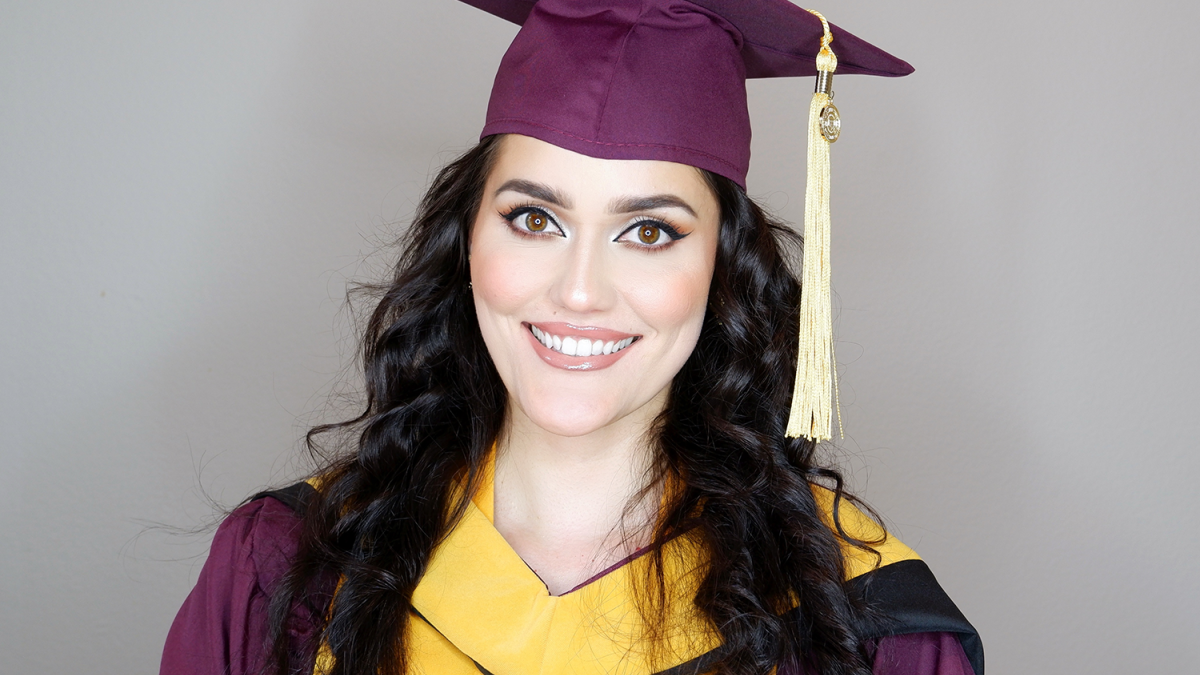Ukrainian first-gen grad perseveres in the face of tragedy

In the fall, Tatyana Klyuchnyk completed her master’s degree in forensic psychology from ASU’s New College of Interdisciplinary Arts and Sciences. Photo courtesy Tatyana Klyuchnyk
When news first broke of Russia's invasion of Ukraine nearly one year ago, first-generation Arizona State University graduate Tatyana Klyuchnyk immediately thought about her family and friends who lived in Ukraine.
“It seemed surreal. I just couldn't wrap my brain around it,” Klyuchnyk said. “Obviously, there's a lot of wars, but when it happens to your home country, that hits close. Not hearing from our family and friends, not knowing what's going on, not knowing if they're OK — that was very hard.”
At the time, Klyuchnyk, who lives in California, was an ASU Online student working toward her master’s degree in forensic psychology from ASU’s New College of Interdisciplinary Arts and Sciences.
“In terms of school, this whole experience made me start reevaluating my entire life and it was hard to just do my daily, regular activities like waking up, going to work, doing homework. ... All of that just seemed so trivial to me,” she said.
As time went on and Klyuchnyk received news that her friends and family were safe, she found that immersing herself in her education was the most productive way to cope with what was going on in Ukraine. In the fall, she completed her degree. Here, she shares more about her experiences at ASU and what’s next for her.
Question: Did you have an “aha” moment when you realized you wanted to study forensic psychology?
Answer: All through high school, I knew I was going to do something with health care. I wanted to be a doctor or a nurse. I took a lot of prerequisites and volunteered at a hospital, and that's when I figured out I didn’t really want to be a nurse, but I still wanted to do something with health care. I changed my major and I got my bachelor's in health care administration from Sacramento State University, and I worked in that field for a little while.
I have two passions in my life. One of them is health care and taking care of people, and the other is criminal justice. After a while of working in the health care field, my interest in criminal justice was still brewing in my mind. I’m a total addict to true crime documentaries and podcasts. I would just sit and watch court hearings for hours; I just found all of that to be fascinating. … I knew I wanted to get a master's degree; I was thinking about it for a very long time. I ended up realizing that I could do something like forensic psychology that would speak to both of my passions.
Q: Who at ASU taught you the most important lesson?
A: My success coach Paulina Peng was amazing because she would call me every session to just check up on me, figure out if I needed anything and see how I'm doing. She was definitely there to keep reminding me to take breaks because she knew how busy I was with everything going on. She taught me how important it is to have somebody you can talk to and to have a good support system. Just knowing that I could pick up a phone and call her and figure something out because she would always be there and knowing that I had options was tremendously helpful.
Q: What message or advice would you share for future first-year students?
A: I am a first-generation college student and an immigrant. When we came here, I was 9 years old. I still remember my first day at school when I didn't understand anybody. I didn't speak the language. I've always had this feeling of an outsider. … Even when I went to high school and when I was getting ready to go to college, I couldn't go to my mom and ask her how to do stuff. … After I got my bachelor's degree, that's when it kind of clicked. I realize I can always go and get help if I don't understand something. There's a process and there's always people to help. So my advice would be: If you really want it, you can do it. You can do anything.
Q: What are your plans after graduation?
A: I am planning to go on to get my PhD because I might as well finish the road. I'm also very interested in becoming a forensic psychologist. … That would be my ultimate dream goal to achieve because this profession does combine my passions in criminal justice and health care. That’s what I’ll be working toward and I'll see where I end up.
More Science and technology

From food crops to cancer clinics: Lessons in extermination resistance
Just as crop-devouring insects evolve to resist pesticides, cancer cells can increase their lethality by developing resistance to…

ASU professor wins NIH Director’s New Innovator Award for research linking gene function to brain structure
Life experiences alter us in many ways, including how we act and our mental and physical health. What we go through can even…

ASU postdoctoral researcher leads initiative to support graduate student mental health
Olivia Davis had firsthand experience with anxiety and OCD before she entered grad school. Then, during the pandemic and as a…